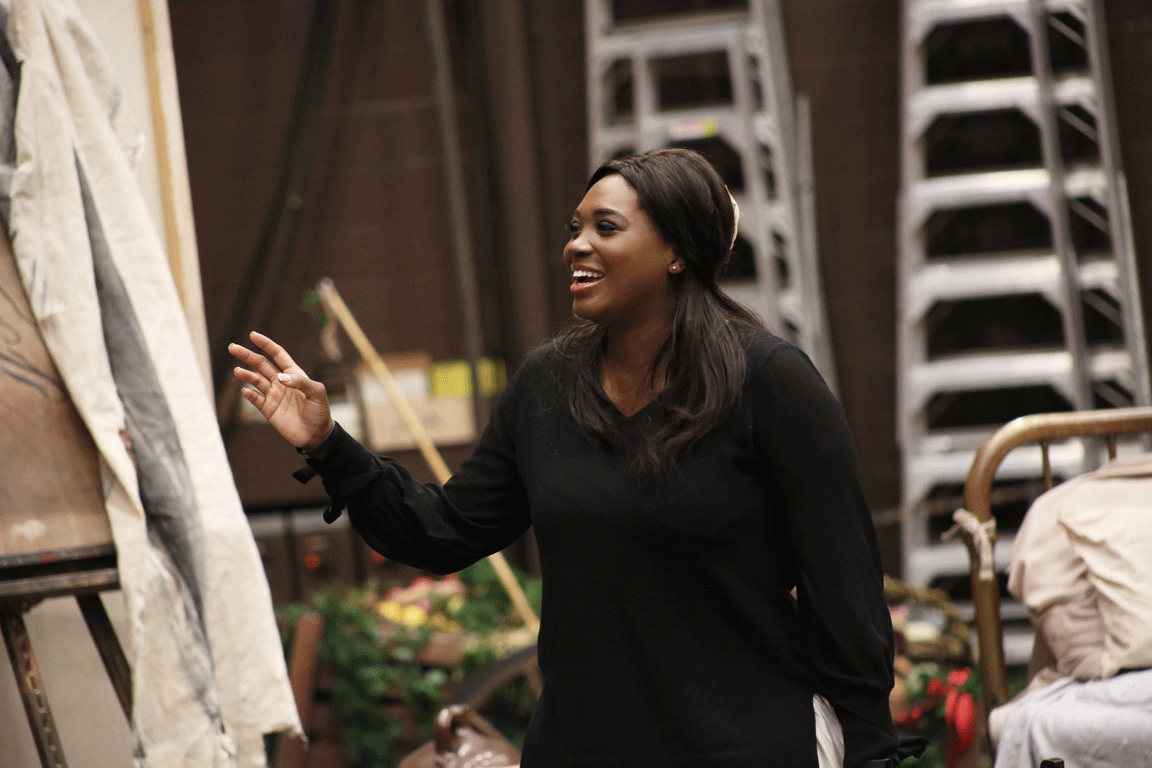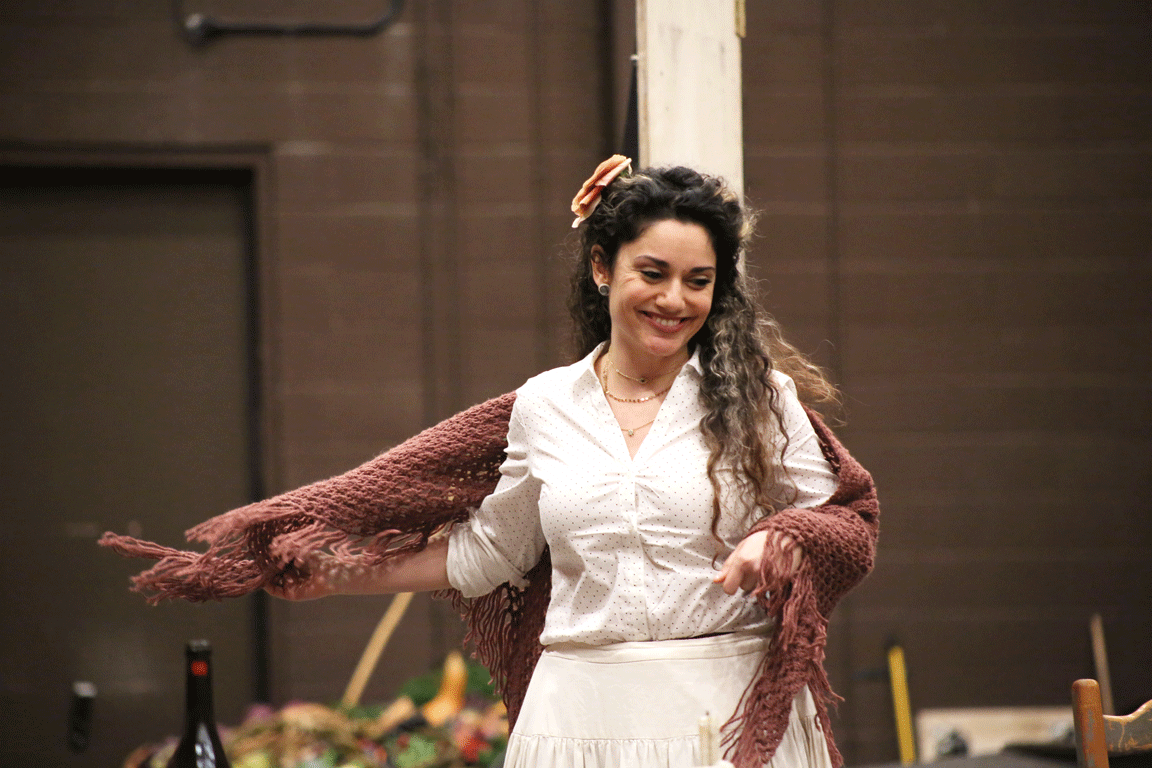-
Mimì to Mimì: Our Leading Ladies in La Bohème
By COC StaffPosted in 18/19
This spring, we welcome two fantastic casts for our production of Puccini’s La Bohème. Angel Blue and Miriam Khalil, our two Mimìs, had a chance to e-interview each other just before rehearsals kicked off to talk about their approaches to the role, their opera journeys, and what’s kept them going in this wonderful (but challenging!) art form. Angel Blue
Angel Blue
Angel: Hi Miriam, how wonderful to meet you! This will be so much fun. I look forward to meeting you in person and to be performing Mimì with you.
Miriam: Angel, it’s so nice to e-meet you. Looking forward to meeting in person soon!

Miriam Khalil
Miriam interviews Angel first.
M: When did you decide that opera was your path?
A: I knew at a very young age that opera was my path because my dad loved opera so much. His love for the art form was contagious. The moment it really clicked for me happened when I was four years old at a concert version of Turandot. I told my dad that "I wanted to be like the woman in the light." He looked and me said, "You most certainly can be like the woman in the light." :-) I'm thankful for that moment.

M: Mimì is one of your signature roles and I know you have lived with her for quite some time. I’m wondering what it was like to sing her for the first time?
A: Mimì is one of my best friends. When I first performed La Bohème as Mimì the production was done in English. I feel like I really understand the text because of that. The biggest difference in singing Mimì from the first time to now has been becoming more comfortable with the heavier passages.
M: Are there moments that still surprise you about Mimì?
A: Yes — one in particular is when she "falls asleep" before "Sono andati" in Act 3. I'm always surprised that she would not just ask the others to leave the room instead of pretending to be asleep so that they would leave.
M: Do you have a favourite moment in La Bohème?
A: YES! After Benoît gets kicked out of the apartment in Act 1 the men sing "Via di qua"— I love the harmony there and the orchestra's scaling crescendo during it, then it goes right to a meno piano for "E buona sera a vostra signori-... Hahahaha!" THE BEST PART EVER!
M: Do you have any rituals or routines leading up to a performance?
A: Practicing, praying, and trying to be patient with myself. These are my "Three Ps for Peace."
M: Do you have any advice for young singers that want to pursue this crazy and amazing career?
A: Keep practicing, keep studying, keep believing in yourself. Your opinion of your voice and yourself is the most important — not what anyone else says, thinks, or believes of you. Your circumstances do not have to define you, but they should inform you on how to become better in what you do.
M: Was there something someone said to you that helped to push you forward in negative moments?
A: Yes, my dad told me before he passed away not to give up on myself. I was very despondent because at the time I was competing in beauty pageants and was trying to get into a young artist program. It seemed like every audition, every competition was a "no" or "not this time" or as one head of an opera company put it, "why are you here again?" I felt very bad, but my dad's words were always on my mind: "Angel, keep going and don't give up. You'll win if you don't quit."
M: Who inspires you?
A: People like you, Miriam!! :-)
M: Same to you! You're amazing!
Now it’s Angel’s turn to interview Miriam.
Angel: What attracts you to the role of Mimì?
Miriam: Oh — so much! :) I'll try not to write a novel for this one. Mimì, as you know, has some of the most beautiful music and it's because her thoughts and her heart speaks through her music. She says very simple things but when she starts to speak about spring and the sun we are let in to the most incredible and colourful world. She sees beauty in the simple things, but in so much detail and care. She feels so deeply and isn't afraid to show it. She is honest and open and doesn't feel the need to be more than she is.
A: Have you sung Musetta before?
M: I have sung Musetta. She is very fun. Doesn't take anything seriously and is so spontaneous and loud. In a way, I feel she is Mimì in an earlier lifetime, when she took things for granted and got everything she wanted and was never satisfied. She hadn't yet realized how fragile life is, but knew she had to live it to the fullest and take advantage of every situation as if it were her last. I love how caring she is and how selfless she can be. When she sells her earrings to buy Mimì a muff then refuses to take credit so Mimì would think it was Rodolfo that bought it for her... heartbreaking. I have to admit that I do prefer Mimì though... but only because I love sad music and feeling things really intensely (as we all do).
A: Why do you think Rodolfo says such harsh words about Mimì when talking to Marcello in Act 3?
M: I think there are a few reasons for this. One is so that Marcello won't judge him too harshly for leaving her. Another is that he is jealous. I do think Mimì has a history and has had a few male suitors that have helped her along the way. I think that is why they call her Mimì... it's not her real name but the name she uses in those situations. In any case, the biggest reason comes just after, when he reveals to Marcello that Mimì is so sick that she is dying. He lies about her, I think, because he is scared and can't afford to help her. So instead of blaming himself, he pushes her away.
A: Has your son watched you perform Mimì? What does he think of the show? (My stepson saw La Bohème when he was six years old and loved it.)
M: My son has only been to a rehearsal of La Bohème. He is five and will see this production for sure. I don't think there is an age too early for La Bohème, though perhaps for other audience members’ sake I'd say four is a good age. On a side note, my son was in his first opera when he was four months old. He played my daughter in Pelléas et Mélisande. He has been in rehearsals with my husband and I ever since and he loves it. The older he gets, the more engaged he is and it's amazing to see him try and understand what is going on when it's in another language. Because he's been around it his whole life, it never enters his mind that it needs to be in English to be understood. He just goes with it and loves the experience and the music.
Miriam with her husband, Joel Ivany, and son
A: What is your favourite moment in La Bohème?
M: I love the phrase “Buongiorno Marcello” (when Mimì speaks to each of the Bohemians individually before pretending to sleep). The way those two words are written and the peace these few notes create is haunting; there’s so much joy and love in those two words. The other is “bada” in “Donde lieta,” just after she asks him to put her things together so that she can ask the porter to pick them up. This word, meaning “look,” and the way she sings it is everything. It's what she does the whole opera — she comforts him. She is always making it easy for him to leave her. She never wants to hurt him... it's perfection in two notes.
A: What have been some obstacles that you've had to face in this career?
M: There has been a lot of rejection. It is not an easy path that we've chosen but it is so fulfilling when we get to sing. I have overcome a lot through stubbornness and the inner knowledge that this is what I was born to do. I love the challenge of continuing to grow and improve. I have had a great deal of support from my family, friends, teachers and coaches and that is priceless. In the worst of moments it's my husband, my family and my best friends that keep me going. They remind me that there are other opportunities, that there will be other roles, and simply put, that there is so much more to life. Since becoming a mom, a lot has also changed and so much has been put into perspective.
A: What advice would you give to young singers who are studying in school?
M: I would tell them to learn languages and to learn other skills like administration, stage management, directing, and conducting to be as well-rounded as possible. This also helps them understand other roles and perhaps find other ways of contributing in this industry. I would encourage them to create and if that is not their strength, then to join with creators and make opportunities for themselves and their colleagues. They may find that their passion doesn't just lie in singing, and that they have other skills that can help them when they aren't making money singing.
I would also tell them to ask as many questions as possible. To remember that failure happens but the most important thing is not to give up on themselves. To be kind and forgiving to themselves — this is a big one that I had to learn (and am still learning).
A: How long does it take you to learn a new role?
M: It's a gift and a curse but I can learn a role in a few days. This is not to say that I can sing it in a few days, just get it in my head (which took some time to realize when I was younger). To properly learn a role, I need at least a couple of weeks of working it on my own, then at least a month of working on it with my teacher and coaches before we get into rehearsals. I don't always get that time but that's my ideal.
A: When did you know that opera was your passion?
M: I knew in my first year in university when I was in the chorus of Dialogues des Carmélites. I had had no prior exposure to opera really until then. I had lessons with a great teacher in high school, but as far as I knew I was going into music therapy and this was just a year of music and learning. I had never seen an opera or been that close to many singers. It was a mandatory course for voice majors and I had no idea what I was getting into. I knew, though, that my whole life was changed. To sing, feel, act, commit and to hear your emotions scored by the music, that was it. There was no going back after that.
M: Thank you for the great questions and beautiful answers. I was excited to meet you before but now I can't wait. xo
Puccini's La Bohème is on stage from April 17 to May 22, 2019 at the Four Seasons Centre for the Performing Arts.
Production originally made possible by
Jerry & Geraldine Heffernan
Thank you for joining us for Giacomo Puccini's La Bohème.
Tell us your favourite moment: #COCBoheme #FavouriteMoment | @CanadianOpera
Take your culture game to the next level, with our monthly eOpera.
YOU MIGHT ALSO LIKE...
Hear it First: Angel Blue's Mimì (Canadian Opera Company, 2019)
Your Favourite La Bohème Moments (Canadian Opera Company, 2019)
Primer: Puccini's La Bohème (Canadian Opera Company, 2019)
Director's Notes: La Bohème (Canadian Opera Company, 2019)
Explore the Music of Puccini's La Bohème (Canadian Opera Company, 2019)
